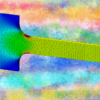The finite element method (FEM) is essentially very complex math used by engineers to reduce the number of prototypes and virtual experiments necessary to create a successful design. In previous […]


The finite element method (FEM) is essentially very complex math used by engineers to reduce the number of prototypes and virtual experiments necessary to create a successful design. In previous […]

The finite element analysis (FEA) is leading to major breakthroughs in nanotechnology, and having a huge impact on a number of industries spanning electronics, material science, quantum science, engineering, and […]

The Finite Element Method (FEM) is a popular tool used by engineers to reduce the number of prototypes and virtual experiments necessary to create a successful design. It uses complex […]

Photonics engineers rely on optical simulations for their designs. Depending on the optical size of their model geometry, they need to choose the best method for performing these simulations, according […]

Researchers from Tokyo University of Science have developed a new design method that could lead to lighter, faster, and cleaner vehicles and airplanes. Their technique, published in Composite Structures, simultaneously […]

Engineers are increasingly embracing computer simulations to test the structural integrity of their prototypes. These computer simulations are based on the finite element method (FEM) and finite element analysis (FEA), […]
MIT engineers recently designed a tunable “metalens” that can zero in on objects at multiple depths. The lens, constructed from a transparent “phase-changing” material capable of rearranging its atomic structure […]

In 2020, photonics researchers used the finite element method (FEM) to make a number of exciting discoveries in the field of optics. As discussed in a previous post, FEM is […]

The majority of medical, scientific, and industrial applications utilize high-power diode-lasers (HPDLs). Due to the common use of HPDLs, it’s more important than ever to prevent optical and physical malfunctions […]

Optical lenses are vital components to the manufacturing and labeling of goods. For example, optical lenses are found in electronic devices like smartphones and laptops. They’re also used to make […]
